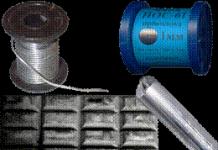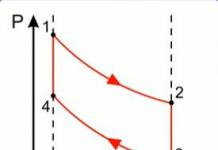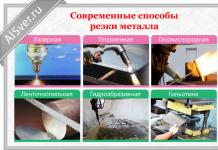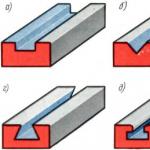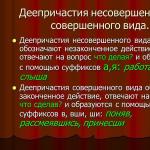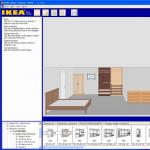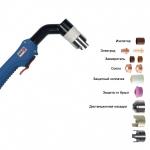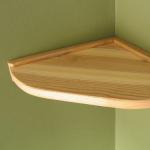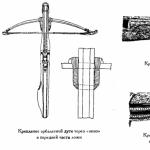Verification work on the topic "Isolated members of the proposal." Option. № 1.
1. Write off, replacing the subordinate clauses with participial revolutions:
These were the guys who came to visit me. We saw a flower bed, which was completely strewn with flowers. Before us is a mighty tree that has spread its branches in different directions.
1. A smooth ocher-white road leads past a flowering willow.
The grass burned out, the trees turned yellow, and the dried trees rang dryly in the wind.
And my friend Petya Klyaksin fought with geography.
The fierce winter has reached the pass.
The forest, recently awakened from its winter hibernation, breathed moist freshness.
The downpour ended in the sky, there was still a black cloud thinned by rain.
7. The driver got out of the car, still very young, tall and swarthy in overalls reeking of gasoline.
Having laid out the toys on the sofa, the children began some interesting game. Some of the kids, having taken up drawing, did not want to go to lunch. After reading the story, he seemed too sad to me. On the way home, it was raining.
staggering. .. went out into the air. Gulliver glancing. ...couldn't stop laughing.
Stopping Returning
Angry ... the queen ordered severe punishment.
Verification work on the topic "Isolated members of the proposal."
Option № 2
1. Write off, replacing the subordinate clauses with participial phrases:
Before us is a mighty tree that has spread its branches in different directions. But the city birds that are accustomed
fly lower, do not rise to such a height. The World Weather Watch, which has already been created on the planet, will become somewhat different.
2. Write off, punctuate. Indicate the numbers of sentences in which there are separate members of the sentence.
1. The wick crackled, black streams shot up and covered the glass with thick soot.
2. The willows, unsteadily reflected in the input, turned slightly pink like the glass of a lantern from a warmed candle.
The handful of ears of corn left on the paths was called a beard.
4. Pour vegetable oil into any thoroughly washed and heated pan.
5. To the side on the village threshing floor rowan flared.
6. A slice of lemon in tea can be slightly squeezed with a fork and then removed and put on a saucer
7. Below, under the booming trembling bridge, lay wide dark water and columns of lights were freezing in it.
3. Find the deformed sentence and write it down in the corrected form.
I opened the window and admired the view of the city. Opening the door, she creaked loudly. The brother, bowing his head, wrote something. Finishing the drawing, my pencil broke.
4. Spread single gerunds by turning them into gerunds. Set up punctuation marks.
The exhausted Gulliver struggled to his feet and staggering ... went out into the air. Gulliver glancing .... couldn't stop laughing.
Stopping ... Gulliver saw that the sailors left him on the shore. Returning ... Gulliver told about his adventures.
Option 1
1) playing around
2) briefly
3) kilometer
4) Raised
2. In which sentence does the participial phrase come before the word being defined? (No pre-punching marks.)
1) Everything was covered with recently fallen snow.
2) I looked at the moonlit pond.
3) The foliage plucked from the trees quickly swirled in the air.
4) The illuminated shore seemed mysterious from afar.
3. Which sentence has a grammatical error?
1) The barking dog did not let anyone into the house.
2) Frost, which struck at night, immediately changed everything.
3) I went out to a clearing illuminated by the sun.
4) Encouraged by his comrades, the student quickly solved the problem.
4. In what word is one letter written at the place of the gap n ?
1) frozen vegetables
2) boiled in a saucepan
3) unwanted guests
4) pickle ... cucumbers
5. In what word is a letter written at the place of the gap e ?
1) pumped out ... barrel
2) started a dispute
3) dependent on parents
4) restrained ... whisper
6. Which word has two letters n ?
1) distilled
2) fresh frozen
3) early
4) forged ... th
7. Indicate which numbers in the sentence should be replaced with commas.
The elk ran out to the edge (1) overgrown with bushes (2) and (3) without stopping
(4) went to the shining (5) in the rays of the setting sun (6) the river.
1)1,2 3)1,2,3,4
2)1,4 4)1,2,3,4,5,6
8. Choose the grammatically correct continuation of the sentence.
Entering the assembly hall
1) I have a tingle in my eyes.
2) I was blinded by the spotlights.
3) I immediately approached my classmates.
4) Everyone immediately paid attention to me.
9. Indicate the sentence in which one comma is placed. (No punctuation marks.)
1) Tourists drank icy water from the spring and thanked the owner and set off.
2) Having passed a narrow path, we came to a forest road.
3) Mitya worked tirelessly.
4) Sashenka looked at them smiling and began to make tea.
10. In which line in all words is a letter written at the gap O ?
1) dry ..., left ..., clean ...
2) insinuating ..., dry ..., easily ...
3) correct ..., verbatim ..., changeable ...
4) red-hot ..., long ..., intelligible ...
11. Specify the hyphenated spelling of the word.
1) (by) write more
2) (in) winter dress
3) (to) do it better
4) (by) do a little
12. In what word at the place of the pass b not written?
1) hit backhand ...
2) rush galloping ...
3) overgrown completely ...
4) get married...
13. In which example is a mistake made in the use of a preposition?
2) miss my mother
3) upon receipt of the letter
4) according to the order
14. In which sentence is the highlighted word spelled together?
1) It's already dawn So) it was time for us to hit the road.
2) We Same) wanted to get home faster.
3) The boys hid but) tree.
4) Valya is sure what she thinks Also), like mom.
15. In what sentence Not with the word is written separately?
1) (Un)solved mysteries attract us.
2) I felt an almost (un)controllable desire to grab the beast.
3) There are many types of vulgarity (not) noticed by us.
4) (In) lack of food made them hurry.
16. In which row are all words written with a hyphen?
1) far (far), if (would), (by) softer
2) (something) as (as if), a little (slightly)
3) (on) friendly, someday, (barely)
4) somewhere (something), (according to) dalype, (according to) motherly
17. Give a simple sentence.
1) For the hundredth time, I regretted that I was not born an artist.
2) The storm has passed, and a branch of white roses through the window breathes aroma to me.
3) We went along the coast to find a place even deeper.
4) Thanks to my father, my sisters and I know French well.
18. Indicate which numbers should be replaced by commas in the sentence.
The old man was sitting on a bench (1) basking in the sun (2) and (3) smiling serenely
(4) occasionally glanced anxiously at the road.
1)1,2,3 3)1,2,3,4
Part 2
(1) Entering the yard, I looked around. (2) The picture, which reminded me of my childhood, was surprisingly sweet and peaceful. (3) A large grandmother's hut stood in the middle of the courtyard, occupying a lot of space and being the center of the whole economy. (4) Behind it were the river-cities descending towards them. (5) A furry dog got out of the hut, came up to me, sniffed and wagged his tail. (6) Paying no attention to me, they wandered under the hens. (7) The piglet, grunting, fiddled in the barn. (8) Suddenly the door swung open, and, frozen in surprise, I saw a grandmother on the threshold. (9) She hasn't aged at all. (10) So many years have passed, but the grandmother was the same. (11) I rushed to her headlong, not remembering myself for happiness. (12) In front of the house flashed past childhood.
19. Which statement does not correspond to the content of the text? Write down his number.
1) Grandmother was very surprised to see me.
2) During this time, the grandmother has not changed.
3) The dog was very good-natured.
4) Grandma's hut was in the middle of the yard.
20. Write a way to form a word surprise (Proposition 8).
21. From sentences 5-7 write out all the prepositions.
22From sentences 8-10, write out all the unions.
23. Among sentences 8-12, find a sentence with a phraseological unit. Write the number.
24. How many grammatical bases are in sentence 8? Write your answer in numbers.
25. What is complicated sentence 1? Write the number of the correct answer.
1) isolated circumstance
3) a separate definition
4) common treatment
Option 2
1. In which word is the letter denoting the stressed vowel correctly highlighted?
1) arrived
2) started
3) applied
2. In which word is the letter written in the gap Yu ?
1) racing ... racing
2) breathable
3) stele ...
4) ver...
3. In which sentence does the participle come before the word being defined? (Signs of pre-kicking are not placed.)
1) Coins minted in the ninth century are still found in barrows.
2) A school was built next to the estate for peasant children who did not know how to read and write.
3) Dogs that belonged to no one found their protector in the writer.
4) The writer, who did not like arrogance very much, was simple and polite with everyone.
4. In which sentence is there a grammatical error?
1) Opening the window, I admired the view of the city.
2) Opening the door, she creaked loudly.
3) The kid, having taken up drawing, did not want to go to lunch.
4) Having laid out the toys on the sofa, the children started some interesting game.
5. In which word is one letter written in the place of the gap n ?
1) twisted thread
2) disheveled ... hair
3) sowing ... with a seeder
4) dried mushrooms
6. In which word is the letter written in the gap e ?
1) hanging clothes
2) pumped out water
3) shot cartridges
4) pulled out tools
7. Which word is missing a letter e ?
1) red
2) confused ... n
3) move..my
4) washing ... washing
8. Indicate whether commas should be placed in place of any numbers in the sentence.
I went through a field (1) spread out behind a forest (2) and (3) overgrown with some herbs (4) and by midnight I reached my goal.
1) 1, 3, 4 3) 1, 2, 3, 4
9. Choose the grammatically correct continuation of the sentence.
After reading the story
1) He seemed too sad to me.
2) I have increased interest in prose.
4) retell it.
10. Indicate a sentence in which one comma is placed. (The punctuation marks are not placed.)
1) The dog constantly looking back ran ahead of the hunter.
2) The bullet hit a stone and screeched back into the ditch.
3) Tonya hurried to break the awkward silence by inviting Pavel to enter the house.
4) The guys hugged each other sitting by the fire.
11. In which line is a letter written in place of a gap in all words O ?
1) dark ..., left ..., first ...
2) literally ..., simply ..., ahead of schedule ...
3) clean ..., sufficient ..., confidential ...
4) satiety ..., intelligible ..., correct ...
12. Specify the hyphenated spelling of the word.
1) (on) wider open
2) (according to) hot in summer
3) (in) third rows
4) (by) winter garden
13. In what word in the place of the pass b not written?
1) jump off ...
2) run away etc...
3) strewn all over...
4) became unbearable ...
14. In what variant is there a mistake in using the preposition?
1) after graduation
2) thanks to resourcefulness
3) contrary to opinion
4) for an hour
15. In which sentence is the highlighted word written together?
1) Hide (but tree.
2) And Also), like hundreds of years ago, not everyone comes back.
3) To) no matter what happens, you still have to do your job.
4) Our class was hard at work preparing for the competition, (That's why we won.
16. In what sentence Not with a word is written separately?
1) Your recklessness led to (un)pleasant consequences.
2) (Not) despite the good weather, we did not go on an excursion.
3) A (un)forgettable impression was left by a thunderstorm in the village.
4) (Not) work done on time accustoms to idleness.
17. In which row are all words written with a hyphen?
1) barely (barely), somewhere (something), (along) a new path
2) (in) fifth grade, far (far), (in) comradely
4) (some) something, (in) English, (in) bearish
18. Specify a simple sentence.
1) A girl called out to me, whose face seemed familiar to me.
2) Suok dropped the fourth cake, which was the most crumbly and with grapes.
3) Only bizarre huts stoop, and dew falls loudly from the roofs.
4) The bees, attracted by the sweet smell, circled over the vase of jam.
19. Indicate whether there should be commas in place of any of the numbers in the sentence.
Hadji Murat stopped (1) dropping the reins (2) and (3) unfastening the rifle case (4)
took her out.
Read the text and do the tasks. Write your answers in words or numbers.
(1) During the night, a storm broke out on the sea, lasting for several hours in a row. (2) The waves, raging, rocked the ship strongly. (3) The captain, worried for the lives of the passengers, ordered the lifeboats to be prepared. (4) Listed to port, the ship moved through the stormy sea. (5) Morning has come. (6) And suddenly a gap appeared in the clouds. (7) The team perked up, the passengers had a hope for salvation. (8) The waves gradually subsided. (9) People, smiling weakly and not believing themselves, dared to leave the cabins and, standing on the deck, breathed the salty sea air. (10) The commander of the ship, standing on the captain's bridge, steered the ship along the desired course, and, frozen at the helm, an experienced helmsman awaited further orders.
20. Which statement does not correspond to the content of the text? Write down his number.
1) The captain was worried about the lives of the passengers.
2) In the morning, the passengers had hope for salvation.
3) The commander of the ship stood on the captain's bridge, frozen at the helm.
4) Passengers, having left the cabins, stood on the deck.
21. What part of speech is the word some (sentence 1)?
22. Among sentences 7-10, find a sentence with three participial phrases. Write the number of this offer.
23. Write out the reflexive pronoun from sentence 9.
24. How many grammatical bases are in sentence 10? Write your answer in numbers.
25. Why is sentence 1 complicated? Write the number of the correct answer.
1) a separate definition
2) homogeneous members of the proposal
3) isolated circumstance
4) common treatment
-1 group -
1. Error in explaining the spelling of the letters yeni - en
a) completed - in suf. participles after hissing under stress is written Yo
b) pickled - nn, since this is a verbal adjective
c) wooden - in suf. adj. it is written nn, because this word is an exception
d) stewed over low heat - nn, because there are dependent words
2. Incorrectly formed participle
a) look around
b) liberate - liberate
c) release
d) hug
3. Correctly constructed sentence
a) when she opened the door she creaked loudly
b) opening the window, I admired the view of the city
c) it rained when I got home
d) tearing off a leaf from a branch and slowly circling in the air
4. In a sentence, short participles are
a) predicate
b) definition
c) circumstance
d) addition...
5. Find a gerund
a) building
b) built
c) having built
d) build
6. Offered
The guys who were going to have dinner headed towards a small cafe.
participial turnover is
a) going to dinner
b) guys going to have dinner
c) gathering
d) going to the side
-2 group-
1. Find the right characteristic of the text
At the beginning of summer, many flowers appeared in the forest. Ivan da Marya bloomed on the birch edges, purple bells appeared.
a) The style of speech is scientific
b) Type of speech - reasoning
c) Sentences in the text are connected using generic words
d) Parallel communication
2. Find the wrong accent
a) started
c) rust
d) briefly
3. Find correctly spaced commas in the text.
The vegetable gardens ended (1) and from the sides of the road flashed (2) mud-splattered (3) suburban houses (4) fences (5) and behind them gardens with ancient lindens (6) stretching branches to the middle of the alleys (7) colorful signs (8) passers-by (9) going about their trifling affairs (10) without noticing the thundering train.
a) 123456789 10
b) 1 2 4 6 9 10
c) 1 4 5 6 7 8 10
d) 1 4 6 7 8 9 10
4. Find a sentence with a participle
a) Archaeologists worked in a town famous for its antiquity.
b) Between the hills ravines overgrown with bushes wind.
c) Vladimir, left alone, wrote a request for a vacation.
d) Wet, we were in a hurry to go home.
5. Find participles that do not require knowledge of verb conjugation to write vowels in suffixes. irregular shape
a) under construction
b) saw
c) visible
d) piercing
6. Find a participle with the suffix ash
a) meaning ...
6) swaying... swaying
c) creeping
d) that ... look for
-3 group-
I. Find the right statement
a) The real participles of the present tense are formed from transitive and intransitive verbs of the perfect and imperfect form. The spelling of suffixes depends on the conjugation.
b) Passive participles of the present tense are formed from transitive verbs of the perfect and imperfect form.
The spelling of suffixes depends on the conjugation.
c) Passive past participles are formed from transitive verbs of the perfect form of neses.
(The spelling of suffixes depends on the indefinite form.) education comes from the basics. unspecified verb form.
d) The real participles of the past tense are formed from transitive verbs of the perfect form.
The spelling of the vowel depends on the indefinite form.
2 Wrong spelling explanation
a) The particle NOT with the gerund is written separately, except when the gerund without NOT is not used
b) NOT with adverbs is always written separately
c) NOT written separately
1) with short participles
2) with full participles, in which there are dependent words
d) NOT with an adjective is written separately when there is a contrast with the conjunction A
3. From the verb "gather" can be formed
a) real participles of the present tense
b) real past participles
c) present passive participles
d) passive past participles
4. Which word has morphological features defined incorrectly.
a) being - unchanged, perfect form
b) reading - unchanged, imperfect. kind
c) sawn off - page, past "time, perfect type, m.r., singular, I.p.
d) holding - real, present, imperfect, m.r., singular, I.p.
5. Find a short adjective
a) the girl is holding back ... but
b) the threads are tangled ... s
c) the uprising was suppressed ... o
d) the sea is agitated.e.o
6. What words spell H
a) confused ... th
b) desired ... th
c) vault ... th
1. Determine in which sentence the highlighted combination of words is a phrase. A) black and white; B) thinkconstantly;
C) the master tells; D) through the forest.
2. In what row are the words Not are synonyms?
A) Strong, heroic, deep, unawakening;
B) famous, popular, famous, famous;
D) to be bolder, bravely, courage, fearless
3. What word is formed by the prefix-suffix method?
A) remake; B) diving;
B) unpleasant D) desktop.
4. In which line is a letter missing in all words And?
A) Show, pr_school, super_interesting;
B) pr_city, without_intersny, support;
C) pr_decorate, without_skhodny, collect_ru;
D) to endure, super-famous, ot_rat.
5. Which word is missing a letter e?
A) burn in flames_; B) stand in the corridor_;
B) wait at the station_; D) forget about time_.
6. Which sentence has a grammatical error?
A) Doctor Akhmetova prescribed medicine to the patient.
B) Our Marat is so sweet!
c) There was a big black piano on the stage.
D) Our director made a presentation at the meeting.
7. In which noun is the suffix misspelled?
A) brick B) lock;
B) a driver D) lubricant.
8. Which word is missing a letter O?
A) Galch_nok; B) black;
B) yellow; D) w_pot.
9. Which adjective wrong rank defined?
A) Cold (wind) - a qualitative adjective;
B) cool (magazine) - a relative adjective;
C) fox (burrow) - possessive;
D) iron (door) is a qualitative adjective.
10. In what sentence Not with the highlighted word is written separately?
a) This school (not) new.
B) The new book turned out to be (not) interesting.
B) I allowed (not) significant error.
D) Vanya and I (not)separable Friends.
11. In what row is it written in all adjectives nn?
A) Long, silver, glass;
B) light, wooden, old;
C) dove, leather, glass;
12. Which adjective should have a suffix To?
A) French
B) German;
B) kyrgyzstan;
D) sailor.
A) (South) Eastern (district);
B) (light) green (foliage);
B) (agricultural) economic (academy);
D) (sly) sly look.
14. In which word at the place of the pass b not written?
A) Seventeen; B) eight hundred;
B) hide D) cut off
15. Which pronoun wrong rank defined?
A) thought about to me- personal pronoun;
B) through some minutes is an indefinite pronoun;
B) took his book - possessive pronoun;
G) every of us dreamed – relative pronoun.
Read the text and complete tasks 16-20.
Nenets fur dolls are wonderful examples of the applied art of the northern peoples. On the stick, which serves as the body of the doll, they put on an elegant coat-panitsa sewn from different pieces of fur. Often the head of the doll was replaced by a duck's beak. This custom is connected with the ancient beliefs of the Nenets.
It was believed that the image of ducks brings happiness, protects from troubles and bad weather. Such dolls were the pride of children, and often they made them themselves.
Sewing from fur requires great skill and skill. From childhood, girls are taught to it. The craftswoman, as it were, plays with pieces of fur, creating a mosaic from them. The combination of dark and light stripes of fur forms a simple and expressive pattern.
16. From the first sentence, write down all the words in which there are more sounds than letters.
17. Pick up synonyms for the word ancient.
18. Write out the verb from the third sentence replaced. Make a morphological analysis of the verb.
19. Write out the first sentence from the third paragraph. Sort by members of the proposal.
20. Title the text. Determine the style and type of speech. Write what crafts and crafts are in your republic.
1. Determine in which sentence the highlighted combination of words isphrase.
A) big and beautiful; B) walks regularly
2. In what series are words not synonyms?
A) Strong, heroic, strong, irresistible;
B) fame, popularity, celebrity, recognition;
C) big, huge, considerable, great, huge;
D) boldly, bravely, courageously, fearlessly.
3. What word is formed by the prefix-suffix method?
A) alteration; B) impassable;
B) unsophisticated D) window sill.
4. In which line is the letter and missing in all the words?
A) Drive, pr_clone, super_interesting;
B) pr_city, non-initiative, support;
C) pr_decorate, inter-institute, pick up;
D) to endure, super-famous, otd_rut.
5. In which word is the letter and missing?
A) Burn with a blue flame; B) stand on the platform_;
B) meet at the pier_; D) remember about the homeland_.
6. Which sentence has a grammatical error?
A) Head teacher Aidarova invited student Ivanov to the office.
B) Our Marcel is such a bookseller!
C) there was a large chimpanzee in the cage.
D) The young therapist made a presentation at the meeting.
7. In which noun is the suffix misspelled?
A) bartender B) a carrier; B) a subscriber D) an employee.
8. In which word is the letter ё missing?
A) Galch_nok; B) black; C) j_ngler; D) shorts.
9. Which adjective has an incorrect rank?
A) Dry (air) - a quality adjective;
B) school (form) - relative adjective;
C) hare (burrow) - possessive;
D) wooden (board) - a quality adjective.
10. In which sentence is it written separately without a highlighted word?
A) This book is (un)interesting.
B) The new folder turned out to be (not) ours.
C) I made an (un)forgivable mistake.
D) Vanya and I are (not) separable friends.
11. In which row is nn written in all adjectives?
A) swan_y, ryazhe_y, glass_y;
B) dull, wooden, old;
C) long, silver, glass;
D) clay, tin, windless.
12. In which adjective should the suffix k be written?
A) Russian; B) tunguz__; C) throw __; D) sailor.
13. Which adjective is spelled together?
A) (North) Eastern (region);
B) (bright) green (grass);
B) (zheleno) road (station);
D) (sly) sly look.
14. In which word is the place of the gap not written?
A) Cut_te; B) eight hundred;
B) hide D) eighteen;
15. Which pronoun has an incorrect rank?
A) He was unlucky - personal pronoun;
B) after some minutes - an indefinite pronoun;
C) took her notebook - a possessive pronoun;
D) each of us asked - a relative pronoun.
Read the text and complete tasks 16-20.
A lot of unexpected superstitions are connected with the felling of trees among different peoples. In Central Russia, for example, peasants never built a house on the site where birch trees used to grow, since their uprooting was considered a sin. Among the Tunguses on the Aldan, it was allowed to remove the bark from a birch for the roof of the plagues only once every two years - after all, she “cries” at the same time. The heroes of the Russian fairy tale “The Hen and the Cockerel”, when they needed to take a little bast from the linden, first send to the cow for oil - to anoint the “sore spot” on the linden.
So for centuries a feeling of careful, careful, loving attitude towards trees, towards nature itself was brought up in a person. (In Boreyko)
16. From the first sentence, write down all the words in which e means two sounds - [ye].
17. Pick up synonyms for the word house.
18. Write out the verb built from the third sentence. Make a morphological analysis of the verb.
19. Write out the first sentence from the first paragraph. Sort by members of the proposal.
20. Title the text. Determine the style and type of speech. Write what beliefs related to respect for nature do your people have?
a) In which sentence in the highlighted participle, 2 letters are written at the place of the gapH
?
1) Behind the fence, they passed a pile of rusty iron rubbish, a pit with hash..th
lime.
2) Kovalev was a tall, thin man in a new, but already oily..ohm
gun quilted jacket draped over the shoulders.
3) Early..s
lay on armfuls of fresh hay and were silent.
4) Seas limited..s
from the rest of the ocean by land.
b) In which sentence is the highlighted participle with a particle NOT
spelled slitly
?
1) Battalion, (unnoticed
enemy, went to the rear.
2) (Not) flying
, but it is almost impossible to see a bird sitting in the rocks.
3) All the same plentiful, (un)touched
nature surrounds me.
4) These were the lines (un)written
poems.
c) Indicate in which sentence a punctuation error was made.
1) The blue of the sea is set off by yellowish-brown algae bushes, scattered one at a time, or connected in fields.
2) The dark sky on the street, illuminated by several lanterns, seemed like a heavy black canopy.
3) Piles of brushwood lay on flat roofs, reminiscent of hats shifted to one side, or the nests of giant birds.
4) On the shore, dotted with small and sharp stones, overgrown with deep green moss, the polar star was even more noticeable.
d) In which answer option are all the numbers denoting commas that distinguish the participle turnover correctly indicated?
Leaves
, (1
) warmed by the sun, (2)
weakly hesitating (3)
fell on the dark (4)
raw tracks.
1) 1, 3;
2)
1, 2;
3)
2, 3;
4) 1, 4.
the approach of winter time, the allowance of horses became very difficult
3) We were (in) sight of the enemy, and it was necessary to give battles
4) Keep (in) mind that the task must be completed by the evening
Specify in which sentence the underlined word is not an adverb and is written separately?
1) two blocks later (to) meet the boys, a woman ran out from around the corner with a basket
2) it’s good to go outside the outskirts at night (to) meet warm days
3) I no longer hoped (for) a meeting with my brother
4) (to) meet the sun crawling dark lead bulk
HELP TO IDENTIFY THE PROBLEM, POSITION HELP TO IDENTIFY THE PROBLEM, AUTHOR'S POSITION and 2 ARGUMENTSIn the dark epochs of history, there was such a state of society in which a feeling of mutual distrust and suspicion weighed over all citizens.
We rejoice that we live in a different time and that the events of that era constitute a tradition for us. But let us take a closer look at the phenomena taking place around us - and we will be compelled to admit that our time is replete with signs of a similar state. More than that: between us, mutual distrust has perhaps taken root even deeper into the inner life of society than at that time. What is most striking in the state of our society in recent years is the absence of that simplicity and sincerity in relations, which is the main interest of social life, enlivens it with a breath of freshness and is a sign of health. How rare it is to see people simply converge; and how gratifying it would be to get along with a person simply, without a back thought, without an artificial background on which vague shadows are drawn that prevent free communication! Such shadows have lately formed an innumerable multitude, like a multitude of dark spirits dispelling turmoil in the air. Where did they come from?
See how people in our society come together - familiar and unfamiliar - for work and without work. As soon as they looked into each other's eyes, as soon as they had time to exchange a word, there was already a shadow between them. From the first word that he said, from the first method of speech that one used, the other already had a back thought: "Ah, that's what he thinks, that's what school he is, that's what conviction he is." Take a closer look, listen, as after this first impression, mutual suspicion flares up more and more.
How much strength is wasted or lies in sterility because of this senseless game of impressions and phantoms of convictions. People, in essence, are honest, kind, capable, instead of doing, as much as possible for everyone, the practical, vital business of life that is assigned to them, they lay down their hands, lose energy, exhaust themselves in fruitless irritation and indignation, deciding that on such principles, with such theories, with such views - activity is impossible. They have not yet put their hands on their case, but they are already disgusted with it, they lost faith in it because it does not correspond to the imaginary theory of the case.
It happens to hear how an educator who manages an institution speaks contemptuously of teachers who uphold the strictness of discipline in education; how a military officer indignantly smashes backward people who prove the necessity of discipline for the army; how a priest from a higher point of view condemns the custom of going to Mass on feast days; how a judge and a learned lawyer call ignorant people who demand punishment for a thief, who assert that servants must obey their masters... Everyone went apart, it became difficult for everyone to unite for activity, because from the very first steps everyone disagrees in thoughts about the matter, or rather say, in phrases that wrap obscure thoughts.
Participation in the Verb (it is formed from it) The Verb (it is formed from it) Species Species Question: what are you doing? having done what? Q: What is doing? having done what? Indicates an additional action Indicates an additional action Recurrence Reflexivity Transitivity Transitivity Depends on the verb Depends on the verb Adverb: Adverb: Depends on the verb ("Appendix to the predicate") Depends on the verb ("Appendix to the predicate") Is a circumstance Is a circumstance It does not change either by numbers, neither by gender nor by case Does not change by number, nor by gender, nor by case Answers questions How? When? For what purpose? Answers questions How? When? For what purpose?
Imperfect and perfect participles. Imperfect participles denote an unfinished action, answer the question what are you doing? and are formed with the help of suffixes a, i: working, hearing Imperfect gerunds denote an unfinished action, answer the question what are you doing? and are formed with the help of suffixes a, i: working, hearing Perfect participles denote a completed action, answer the question what did you do? and are formed with the help of suffixes in, lice, shi: having understood, laughed, brought Perfect participles denote a completed action, answer the question what is done? and are formed with the help of suffixes in, lice, shi: having understood, laughed, brought

Use adjectives correctly. The main action, indicated by the verb-predicate, and the additional action, indicated by the gerund, refer to the same person. The main action, indicated by the verb-predicate, and the additional action, indicated by the gerund, refer to the same person.

Write off, correcting errors, if any. I opened the window and admired the view of the city. I opened the window and admired the view of the city. Opening the door, she creaked loudly. Opening the door, she creaked loudly. Mom was sitting back in her chair. Mom was sitting back in her chair. My brother tilted his head to one side, writing something. My brother tilted his head to one side, writing something. Finishing the drawing, my pencil broke. Finishing the drawing, my pencil broke. On the way home, it was raining. On the way home, it was raining. Having laid out the toys on the sofa, the children began some interesting game. Having laid out the toys on the sofa, the children began some interesting game. Some of the kids, having taken up drawing, did not want to go to lunch. Some of the kids, having taken up drawing, did not want to go to lunch. After reading the story, he seemed too sad to me. After reading the story, he seemed too sad to me.

NOT with adverbs. NOT with gerunds is written separately: not knowing, not doing, not understanding, slowly. NOT with gerunds is written separately: not knowing, not doing, not understanding, slowly. Some gerunds without NOT are not used: perplexed, indignant, unwell, disliking, hating. Some gerunds without NOT are not used: perplexed, indignant, unwell, disliking, hating.

Add NO. ... having given the word, be strong, and giving it, hold on. ... having given the word, be strong, and giving it, hold on. ... knowing the ford, ... poke your head into the water. ... knowing the ford, ... poke your head into the water. ... after killing a bear, the skins ... are sold. ... after killing a bear, the skins ... are sold. ... after looking at the pie, ... say that you are full. ... after looking at the pie, ... say that you are full. ... bowing to the ground, the fungus ... you will raise it. ... bowing to the ground, the fungus ... you will raise it. ... pulling out a seine, fish ... boast. ... pulling out a seine, fish ... boast.

The concept of adverbial turnover. A gerund with dependent words is called a participle turnover. A gerund with dependent words is called a participle turnover. A student with the flu did not come to school. A student with the flu did not come to school. Compare: A student with the flu did not come to school. (participial turnover) Compare: A student with the flu did not come to school. (participial turnover)

Replace the participial turnover with the adverbial participle. The artist who painted the picture showed it to the audience. The artist who painted the picture showed it to the audience. Children bathing in the river sunbathed in the sun. Children bathing in the river sunbathed in the sun. The boy, carried away by reading, forgot about food. The boy, carried away by reading, forgot about food.

Punctuation marks in participles. 1. The participial turnover and the single gerund participle are distinguished by commas, regardless of the place they occupy in relation to the verb. 1. The participial turnover and the single gerund participle are distinguished by commas, regardless of the place they occupy in relation to the verb. All the inhabitants were right there, waiting for the impostor. All the inhabitants were right there, waiting for the impostor. When he saw me, he stopped. When he saw me, he stopped. Returning, he ordered his carriage to be served. Returning, he ordered his carriage to be served.

2. Homogeneous participles and participles are subject to the rule of homogeneous members. 2. Homogeneous participles and participles are subject to the rule of homogeneous members. I eagerly awaited an answer to the letter, not daring to hope and trying to stifle my sad forebodings. I eagerly awaited an answer to the letter, not daring to hope and trying to stifle my sad forebodings.


Set up punctuation marks. What will he learn while serving in St. Petersburg. What will he learn while serving in St. Petersburg. After taking a breath, we moved on. After taking a breath, we moved on. Comrades, noticing his concern, left. Comrades, noticing his concern, left. In the morning, passing by Kazbek, I saw a wonderful sight. In the morning, passing by Kazbek, I saw a wonderful sight. Returning home, he threw himself on the bed without undressing and fell asleep soundly. Returning home, he threw himself on the bed without undressing and fell asleep soundly. Grumbling and looking around, Kashtanka entered the room. Grumbling and looking around, Kashtanka entered the room. Walking through the noisy city and feeling happy, he hummed. Walking through the noisy city and feeling happy, he hummed. The steamboat shouted and, slapping its wheels, dragged heavy barges past. The steamboat shouted and, slapping its wheels, dragged heavy barges past.





5. Indicate the grammatically correct continuation of the sentence. Having taught the horse all the tricks of dressage, 1) a well-deserved reward awaits the rider; 2) it seems that it is not the rider who controls the horse, but the horse-rider; 3) the pirouette was especially difficult for a galloping horse; 4) it was possible to enter the competition.

Repetition of what was learned in the section "Gernal participle". Put punctuation marks in Bunin's poem: Put punctuation marks in Bunin's poem: Reflecting stars in the hollows Reflecting stars in the hollows The pits shine with quiet water. The pits shine with still water. Cranes calling each other Cranes calling each other Cautiously stretch in a crowd. Cautiously pull in a crowd. And the spring in the icy grove And the spring in the icy grove Waiting for the dawn with a breathless breath. Waiting for the dawn to breathe.

Open the brackets, put punctuation marks. Thunder rumbled (un)ceasingly. Thunder rumbled (un)ceasingly. The rain drummed on the roof as if angry and (not) angry at someone. The rain drummed on the roof as if angry and (not) angry at someone. In the garden outside the windows (not) silent for a single minute, the sparrows screamed. In the garden outside the windows (not) silent for a single minute, the sparrows screamed. (Not) remembering myself with delight, I ran home. (Not) remembering myself with delight, I ran home.


